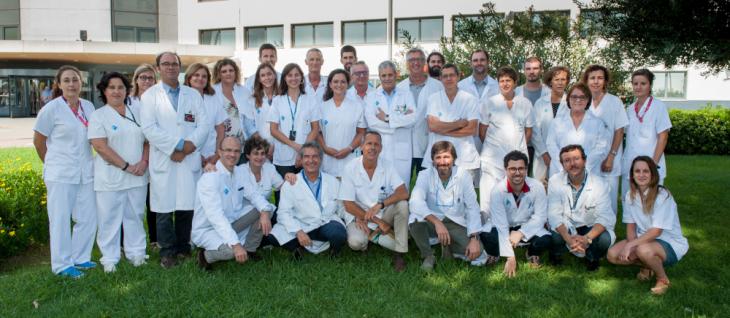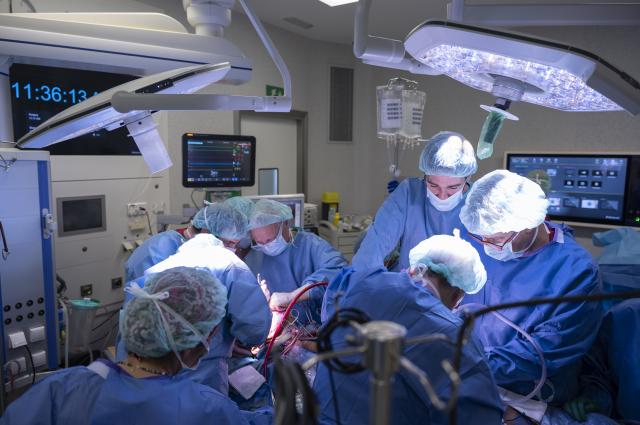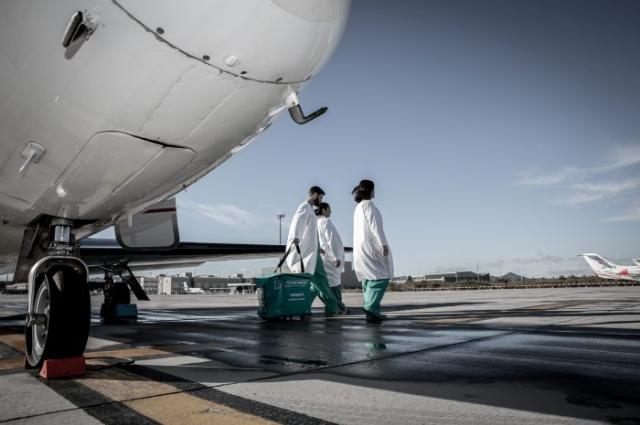
The urology department offers top level specialist care in all areas of urology, including all modern technological developments such as minimally invasive surgical techniques, prosthetic surgery, and new urological diagnosis tools. The great emphasis on multi-disciplinary work in the fields of oncology, kidney transplantation, and reconstructive urological surgery offers a comprehensive focus on the complex patient and growth towards healthcare excellence. It represents the centre of reference for the area of southern Hospitalet and Prat del Llobregat, from where close relationships have been established with the primary care areas to encourage fast access to hospital activities. As a highly complex hospital of reference, it includes a large area of reference in l’Hospitalet de Llobregat, the districts of Baix Llobregat, Alt Penedès and Garraf, an area that can be increased for certain pathologies such as kidney transplantation and complex oncological surgery, to include Tarragona and Terres de L’Ebre. The healthcare activity is distributed into different clinical units for the super-specialisation of the professionals in the healthcare area and in teaching and clinical research.
Staff
Head of Service
Cap de Servei

Head of Section
Facultatius/ives especialistes
Caps de Secció
Senior Teacher
Caps de Secció
Head of Nursing Area
Infermeres gestores
Managing Nurse
Infermera gestora
Specialist Doctors
Specialist Doctors
Specialist Doctors
Specialist Doctors
Facultatius/ives especialistes
Facultatius/ives especialistes
Facultatius/ives especialistes
Specialist Doctors
Facultatius/ives especialistes
Facultatius/ives especialistes
Facultatius/ives especialistes
Facultatius/ives especialistes
Facultatius/ives especialistes
Specialist Doctors
Facultatius/ives especialistes
Facultatius/ives especialistes
Relevant aspects
Renal Lithiasis and Endourology Unit
- The unit is responsible for the comprehensive treatment of urolithiasis in terms of its diagnosis and its medical and surgical treatment, applying all the therapies that our speciality has to offer: extracorporeal shock-wave lithotripsy, open surgery, percutaneous and mini-percutaneous nephrolithotomy, semi-rigid ureteroscopy and flexible ureteroscopy (RIRS). Since 2014 and in selected cases of complex percutaneous access, laparoscopic care has been introduced into the percutaneous surgery with excellent results. The metabolic study of patients with renal lithiasis is also being conducted in order to improve subsequent evolution and reduce the number of lithiasis relapses.
- Every year, the unit gives four Theoretical-practical courses on Endourology (percutaneous nephrolithotomy and ureterorenoscopy), which are attended by specialist physicians from other hospitals in the rest of Catalonia and Spain. Dr Carles Torrecilla, the head of the unit, is currently the National Coordinator of the Lithiasis and Endourology Group of the Spanish Urology Association for a period of 4 years, starting in 2016.
Urologic Oncology Unit
- Urologic Oncology Unit, with the association of the Urologic Tumor association: apart from the diagnostic study and monitoring of patients, it provides a multi-disciplinary view on the treatment of cancer patients thanks to the Urologic Tumor Committee, where decisions are made regarding treatment by Urologists, Medical Oncologists, Radiotherapy Oncologies, Radiologists and Anatomopathologists. Significant efforts have been made in this unit to benefit the patients, with the advantages of minimally invasive surgery, first with the conventional laparoscopy (started in 2003) and then with the robot-assisted laparoscopy in 2009. Since then, all surgeries involves these techniques, except for large rental tumors with venous thrombosis affecting the intrahepatic inferior vena cava.
Procedures carried out:
- Bladder and upper urinary tract tumor: transurethral rescissions, neo-adjuvant and adjuvant treatment, laparoscopic nephroureterectomy with retroperitoneal lymphadenectomy, radical laparoscopic and robot-assisted cystectomy-prostatectomy, with intracorporeal bypass.
- Kidney Tumor: partial and radical laparoscopic and robot-assisted nephrectomy, cytoreductive surgery of the metastatic patient, nephrectomy with laparascopic cavotomy for vena cava thrombosis to the intrahepatic inferior cava level, open radical nephrectomy with extracorporeal surgery combined with heart surgery in cases of intra-auricular thrombosis.
- Penis Cancer: radical and partial surgery with reconstructions, gland reconstruction and partial surgery techniques to avoid phalectomy, where the stage of cancer allows for as such. Locating of inguinal sentinel lymph node. Laparoscopic and/or open inguinal lymphadenectomy, depending on the stage of cancer. Iliac-obturator laparascopic lymphadenectomy.
- Germinal tumor: CSUR centre of reference in retroperitoneal lymphadenectomy of residual masses. Uni- or bi-lateral laparoscopic lymphadenectomy. Open lymphadenectomy with major vessel replacement where necessary.
Unitat de Càncer de Pròstata
- Prostate Cancer Unit Along with the Prostate Cancer Committee: multi-disciplinary unit for the diagnosis and treatment of prostate cancer. The following form part of the Functional Prostate Cancer Unit: Urology (head of the unit), Radiotherapy Oncology, Medical Oncology, Radiodiagnosis, Anatomical Pathology, Nuclear Medicine and Nursing. This multi-disciplinary approach ensures the best treatment for each patient, depending on the type and stage of cancer in question.
Relevant aspects:
- Active Surveillance Protocol: started in 2010 and with one of the most extensive experiences in Catalonia and Spain. Prostate biopsies with RNM image blending: programme started in 2017, the first in Catalan public health and with a level of experience that provides healthcare excellence for patients.
- Robot-assisted Radical Prostatectomy with or without lymphadenectomy: programme started in 2009. With accumulated experience in more than 500 cases at present and excellent functional and oncological results. Experience in surgical rescue after failed treatment with radiotherapy, brachytherapy or focal prostate cancer therapies.
- Prostatic brachytherapy. Prostate implant of radioactive sources for the treatment of prostate cancer.
- Low dose rate brachytherapy. Permanent implant with I131 for the treatment of prostate cancer in monotherapy.
- High dose rate brachytherapy.
- Temporary implant with Ir192 for the treatment of prostate cancer in combination with external radiotherapy.
- External radiotherapy. In monotherapy or combined with brachytherapy as a primary treatment or surgical rescue after post-surgical biochemical recurrence. The most advanced techniques are used, such as VMAT (Volumetric Modulated Arc Therapy) for improved prostate radiation with a decrease in toxicity and shortening of radiation times.
- Systemic disseminated prostate cancer treatment.
- Hormone-sensitive disseminated patient.
- Castrate-resistant patient.
- Clinical trials.
- Access to new drugs for patients with no indication for standard prostate cancer treatments.
- Access to new treatment schemes combining different local and systemic prostate cancer treatments.
Andrology and Urogenital Reconstructive Surgery Unit
The main pathologies seen at the Andrology Unit are erectile dysfunction, male infertility, Peyronie’s disease, and penian curvature and ejaculatory disorders. The Andrology Unit of the Urology Department is a benchmark in the management of these dysfunctions and, given the comorbidity of the general population and the appearance of oncology treatments with pelvic surgery (prostate cancer, bladder cancer and colorectal cancer), the demand and need for specific treatment have increased.
The Andrology unit basically sees and treats patients with erectile dysfunction with are refractory to first line treatments and require the use of aspiration systems, vasoactive drugs or penis prosthesis implantation. Within the different penis prosthetic implants, the use of 3-component hydraulic prostheses is considered the gold standard of treatment.
Since 2014, a Course on Prosthetic Surgery for Erectile Dysfunction and Reconstructive Genital Surgery has been given, with the participation of national and international specialists, which focuses primarily on the implantation of penis prostheses and congenital and acquired penian curvature surgery, and has included gender assignment reconstructive surgery since 2018.
- Penis prosthesis for the treatment of erectile dysfunction.
- Deferentovesiculograhies and testicle biopsies for the study of male infertility
- Vaso-vasostomies.
- Corporoplasties.
- Microsurgical varicocelectomies.
- Surgical treatment of priapism.
- Phaloplasty with microsurgical flap.
- Other penis reconstructive surgeries.
- Endoscopic urethral stenosis surgery (internal urethrotomy) and open surgery (termino-terminal anastomosis, urethroplasties with oral mucous, perineal urethrostomy).
- Gender assignment surgery.
Kidney Transplantation Unit
The Urology Department is involved in the surgical activity for the hospital’s kidney transplantation programme, with more than 3000 transplantations being completed by June 2018. In 2006, the living-donor laparoscopic nephrectomy was introduced in our hospital, and we now have one of the most active living-donor kidney transplantation programmes in Spain and Catalonia, and the most active within the ICS hospitals. As of December 2010 we are part of the National Cross-Donation Programme of the National Health System in Spain as a CSUR centre (Centres, Services and Units of Reference) and we are currently taking part in an international pilot crossover kidney transplantation programme along with Italy and Portugal for the SAT (South Alliance for Transplants).
- Living-donor laparoscopic nephrectomy.
- Living-donor, crossover and ABO-incompatible transplantation.
- Deceased-donor transplantation from the brain dead and type III asystole.
- Complex kidney transplantation.
- Robot-assisted kidney transplantation.
- Reconstructive surgery after surgical complications in kidney transplantation
- Prior urologic reconstructive surgery for kidney transplantation recipients.
Functional and Female Urology Unit
This treats the functional pathologies of the urinary tract, including urinary incontinence of all types and pelvic support defects, neurogenic vesicoureteral dysfunctions and voiding disorders, from their identification and diagnosis to their medical and surgical treatment. Benign prostatic hyperplasia is one of the most common pathologies in Urology. 2 new surgical treatments have been included in addition to the traditional retropubic adenomectomy and transurethral resection of the prostate (TURP). Holmium laser enucleation of the prostate (HoLEP) gives the same functional results as open surgery, with much lower morbidity and a marked reduction in hospital stays. Photo-Vaporisation of the Prostate (PVP) with 180w green laser (greenlight xps) has enabled us to perform 30-40% of the procedures in outpatients as MOS. The increase in male urinary incontinence over recent years is mostly due to the after-effects of the radical prostatectomy for prostate cancer. The unit is a reference within the Costa de Ponent Healthcare Area for the different surgical procedures to treat male urinary incontinence.
- Fluxometry.
- Urodynamic testing.
- Healthcare education programme for intermittent bladder catheterisations.
- Intravesical injections of botulinum toxin (Botox).
- Neuromodulation of sacral roots.
- Benign prostate hyperplasy surgery (open, transurethral resection, Holmium laser enucleation and green laser photo-vaporisation).
- Female urinary incontinence surgery (suburethreal bands, TOT, TVT).
- Male urinary incontinence surgery (implantation of transobturator suburethral sling, adjustable suburethral devices, and artificial urinary sphincter).
- Simultaneous implantation of hydraulic penis prosthesis and artificial urinary sphincter in patients with erectile dysfunction and severe urinary incontinence after radical prostate cancer surgery.
Urological diagnosis clinics
- The Urodynamics Clinic sees patients every day sent to the unit for urodynamic studies requested by members of the same department and from specialist extra-hospital care or from other hospitals in the rest of Catalonia, and it operates a pelvic floor rehabilitation unit that is answerable to the Functional Urology Unit, which primarily treats women affected by stress urinary incontinence. Flexible cystoscopy
- Removal of double-J stent in outpatients
- Urodynamics
- Fluxometry
Research
Lines of research
- Assessment of the delay in renal function in kidneys from
- Maastricht III-type donors using the hypothermic machine perfusion versus cold storage: seeking a more precise assessment. Code URO2017-01
- Prospective, Single-Arm, Study to Assess the Safety and Performance of the TB1-K Device for Organ Preservation in Donor Kidneys for Transplantation.
- Assessment of the effectiveness of Virirec in patients with minor erectile dysfunction. VIRDEL study
- Multicenter prospective study of patients with Peyronie's disease who underwent incision of partial-plaque excision with collagen-fibrinogen-thrombin fleece grafting.
- Observational and transversal study for optimisation of the diagnosis of metastasis in CPRC M0 stage in common clinical practice in Spain. Identifica Study. JAN-CPR-2017-01
- Assessment of the TULSA-PRO transurethral therapy device with MRI-guided ultrasound for prostate ablation in patients with localised prostate cancer.
- Prophylactic negative pressure therapy in recipients of kidney transplantation in obese patients.
Main Publications
- Moncada I, Krishnappa P, Romero J, Torremade J, Fraile A, Martinez-Salamanca JI, Porst H, Levine L.. (2018 Oct 26). Penile traction therapy with the new device 'Penimaster PRO' is effective and safe in the stable phase of Peyronie's disease: a controlled multicenter study. BJU Int [Epub ahead of print]
- Voskuilen CS, Fransen van de Putte EE, Pérez-Reggeti JI, van Werkhoven E, Mertens LS, van Rhijn BWG, Saad M, Bex A, Cathelineau X, van der Poel HG, Horenblas S, Sanchez-Salas R, Meijer RP.. (2018 Sep). Prostate sparing cystectomy for bladder cancer: A two-center study. Eur J Surg Oncol, 44(9), 1446-1452.
- Bonet X, Ogaya-Pinies G, Woodlief T, Hernandez-Cardona E, Ganapathi H, Rogers T, Coelho RF, Rocco B, Vigués F, Patel V.. (2018 Nov). Nerve-sparing in salvage robot-assisted prostatectomy: surgical technique, oncological and functional outcomes at a single high-volume institution. BJU Int., 122(5), 837-844.
- Narváez A, Suarez J, Riera L, Castells-Esteve M, Cocera R, Vigués F.. (2018 May). Our experience in the management of prostate cancer in renal transplant recipients. Actas Urol Esp. 2018, 42(4): 249-255
- Narváez A, Torrecilla C, Colom S, Cuadrado JM, Fernández-Concha J, Riera L, Vigués F. Simultaneous bilateral percutaneous nephrolithotomy: Effectiveness and safety. Actas Urol Esp. 2018 Jun;42(5):316-322
Education
Degree Education
- Subject of Urinary System and Male Genital Tract Diseases. Medicine Degree, 5th year. Bellvitge Campus, Professors: Francesc Vigués Julià; Miguel Ángel López Costea; Manel Castells Esteve; Narcís Camps Lloveras.
Main Building at Bellvitge University Hospital
c/ Feixa Llarga, sn. | 08907 L’Hospitalet de Llobregat. Barcelona
Floor 8 | Telephone number 93 260 77 10

 Presentation
Presentation Staff
Staff Relevant aspects
Relevant aspects Research
Research Education
Education Location
Location News
News
